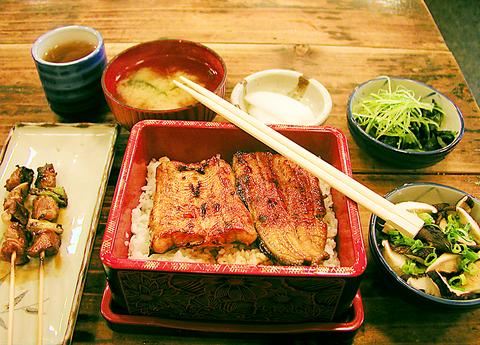The neighborhood around Tienchin Street between Changan Road and Nanking Road is chock full of Japanese restaurants that are visible reminders that this area was previously home to much of the Japanese colonial administration. Now the narrow alleys are a favorite haunt of Japanese businessmen and tourists, as well as hip young Taiwanese.
Fei Qian Wu is not the oldest restaurant in the neighborhood, but it is easily the busiest, due mainly to its low prices and delicious roasted eel. As soon as its doors open crowds begin to converge so that about 20 minutes into its business hours there is already a line out the door and down the alley. With this kind of meal-time crunch, space is at a premium and it's common to share a table with strangers.
The cafeteria feel of the restaurant's seating arrangement extends to its service as well. A small legion of servers scurries about filling orders while others clear tables using clackety pushcarts. Food arrives at the table in no longer than five minutes from the time of ordering.

PHOTO: MAX WOODWORTH, TAIPEI TIMES
Despite the clear emphasis on turning high numbers of tables, not many shortcuts appear to be taken in the kitchen.
Most diners will make a special trip to Fei Chien Wu to eat its roasted eel, which is several cuts above the usual fare at similarly priced Japanese restaurants. A single portion of eel on rice with miso soup costs NT$140, while a double portion comes in at NT$240.
The double portion of eel would be plenty for one person, but it is well worth it to flesh out a meal with some of the smaller dishes on offer. Try the grilled squid, which is sufficient for up to four people or the shrimp and vegetable tempura. The best value must be the chicken kebabs, which cost only NT$20 a piece. The grilled and marinated mushrooms and seaweed are also refreshing choices for summer that cost NT$40 each.
This restaurant does not score high marks in the atmosphere category, but then it's the food and not the ambiance that has kept the store running for over 20 years. First-time visitors to Fei Chien Wu need not be dismayed if there is a line outside the restaurant. The owners see to it that the line moves quickly and the food will make the wait worthwhile.

This is the year that the demographic crisis will begin to impact people’s lives. This will create pressures on treatment and hiring of foreigners. Regardless of whatever technological breakthroughs happen, the real value will come from digesting and productively applying existing technologies in new and creative ways. INTRODUCING BASIC SERVICES BREAKDOWNS At some point soon, we will begin to witness a breakdown in basic services. Initially, it will be limited and sporadic, but the frequency and newsworthiness of the incidents will only continue to accelerate dramatically in the coming years. Here in central Taiwan, many basic services are severely understaffed, and

Jan. 5 to Jan. 11 Of the more than 3,000km of sugar railway that once criss-crossed central and southern Taiwan, just 16.1km remain in operation today. By the time Dafydd Fell began photographing the network in earnest in 1994, it was already well past its heyday. The system had been significantly cut back, leaving behind abandoned stations, rusting rolling stock and crumbling facilities. This reduction continued during the five years of his documentation, adding urgency to his task. As passenger services had already ceased by then, Fell had to wait for the sugarcane harvest season each year, which typically ran from

It is a soulful folk song, filled with feeling and history: A love-stricken young man tells God about his hopes and dreams of happiness. Generations of Uighurs, the Turkic ethnic minority in China’s Xinjiang region, have played it at parties and weddings. But today, if they download it, play it or share it online, they risk ending up in prison. Besh pede, a popular Uighur folk ballad, is among dozens of Uighur-language songs that have been deemed “problematic” by Xinjiang authorities, according to a recording of a meeting held by police and other local officials in the historic city of Kashgar in

It’s a good thing that 2025 is over. Yes, I fully expect we will look back on the year with nostalgia, once we have experienced this year and 2027. Traditionally at New Years much discourse is devoted to discussing what happened the previous year. Let’s have a look at what didn’t happen. Many bad things did not happen. The People’s Republic of China (PRC) did not attack Taiwan. We didn’t have a massive, destructive earthquake or drought. We didn’t have a major human pandemic. No widespread unemployment or other destructive social events. Nothing serious was done about Taiwan’s swelling birth rate catastrophe.